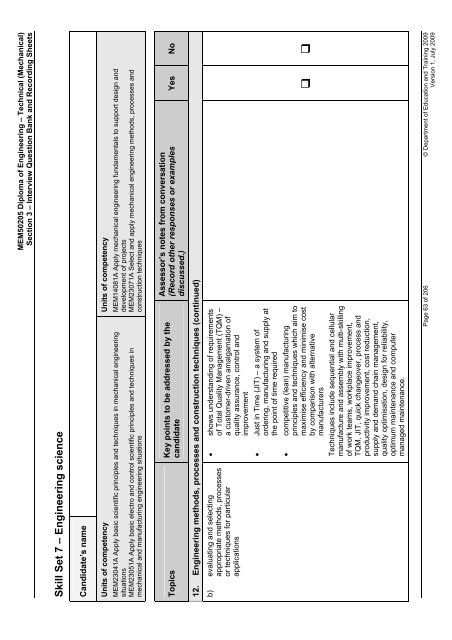(RPL) Assessment Tool Kit - WestOne
(RPL) Assessment Tool Kit - WestOne
(RPL) Assessment Tool Kit - WestOne
You also want an ePaper? Increase the reach of your titles
YUMPU automatically turns print PDFs into web optimized ePapers that Google loves.
MEM50205 Diploma of Engineering – Technical (Mechanical)<br />
Section 3 – Interview Question Bank and Recording Sheets<br />
Skill Set 7 – Engineering science<br />
Candidate’s name<br />
Units of competency<br />
MEM14081A Apply mechanical engineering fundamentals to support design and<br />
development of projects<br />
MEM23071A Select and apply mechanical engineering methods, processes and<br />
construction techniques<br />
Units of competency<br />
MEM23041A Apply basic scientific principles and techniques in mechanical engineering<br />
situations<br />
MEM23051A Apply basic electro and control scientific principles and techniques in<br />
mechanical and manufacturing engineering situations<br />
Yes No<br />
Assessor’s notes from conversation<br />
(Record other responses or examples<br />
discussed.)<br />
Key points to be addressed by the<br />
candidate<br />
Topics<br />
12. Engineering methods, processes and construction techniques (continued)<br />
� shows understanding of requirements<br />
of Total Quality Management (TQM) –<br />
a customer-driven amalgamation of<br />
quality assurance, control and<br />
improvement<br />
� Just in Time (JIT) – a system of<br />
ordering, manufacturing and supply at<br />
the point of time required<br />
� competitive (lean) manufacturing<br />
principles and techniques which aim to<br />
maximise efficiency and minimise cost<br />
by comparison with alternative<br />
manufacturers<br />
Techniques include sequential and cellular<br />
manufacture and assembly with multi-skilling<br />
of work teams, workplace improvement,<br />
TQM, JIT, quick changeover, process and<br />
productivity improvement, cost reduction,<br />
supply and demand chain management,<br />
quality optimisation, design for reliability,<br />
optimum maintenance and computer<br />
managed maintenance.<br />
b) evaluating and selecting<br />
appropriate methods, processes<br />
or techniques for particular<br />
applications<br />
� �<br />
Page 63 of 206 © Department of Education and Training 2009<br />
Version 1, July 2009


